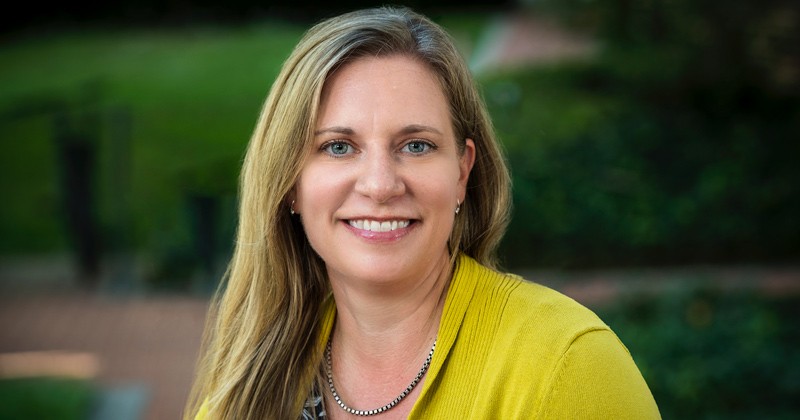Holly Michael appointed DENIN director
Not long after Holly Michael joined the University of Delaware faculty in 2008, she got involved in a brand-new endeavor to bring people together to work on environmental problems.
The Delaware Environmental Institute (DENIN) officially launched in October 2009, and Michael became one of its founding faculty. She thrived, building her professional network among the institute’s more than 200 affiliated researchers, winning grants, teaching students, and publishing research in hydrology, the field of study focusing on the movement and distribution of water on the planet. She also became the institute’s associate director, helping to guide its research program.
Today, Michael, the Unidel Fraser Russell Career Development Chair for the Environment, has a new role at DENIN — as the institute’s director. The appointment, announced by Charles G. Riordan, vice president for research, scholarship and innovation, is effective Sept. 1.
“Professor Holly Michael has an international reputation for research excellence and collaboration, which are critical to driving the Delaware Environmental Institute forward in its mission to advance environmental science, education and problem-solving for sustainable solutions,” Riordan said. “She will lead DENIN’s next phase, building on the efforts of founding director Don Sparks, Unidel S. Hallock du Pont Chair in Plant and Soil Sciences. The University of Delaware thanks Don for his tremendous contributions in establishing and growing the institute, and welcomes Holly as DENIN’s new director.”
Michael, who is on the faculty of the Department of Earth Sciences in the College of Earth, Ocean and Environment, has been principal investigator or co-investigator on more than $33 million in research grants. Her studies have spanned numerous topics relating to water supply and water quality — from assessing the threat of saltwater intrusion on Delaware’s groundwater resources, to devising solutions to the problem of arsenic contamination of drinking water resources in Bangladesh.
She also has received major awards, including Kavli Fellowships from the National Academy of Sciences and the National Academy of Engineering, and the Geological Society of America’s James B. Thompson, Jr. International Distinguished Lectureship.
What are Michael’s plans for DENIN? UDaily connected with her to find out.
Q: How do you feel about being named director?
Michael: I am honored to take on this role and excited for the opportunity to serve the environmental community. DENIN has amazing staff and has been incredibly successful under the leadership of Don Sparks. I look forward to building on those strengths to create new opportunities and synergies to address the complex environmental problems of the future.
Q: Why is this role important to you?
Michael: This role is important to me because it is an opportunity to bring people together — faculty, students, and stakeholders — toward solving the environmental grand challenges that we face in Delaware and across the planet. It is also a way to empower leadership and build community in our research, education and outreach efforts. I became involved with DENIN as a new assistant professor, and I saw the value an institute can bring for junior faculty in particular, building research and support networks that help create a foundation for success. It is important to me to continue to develop mentoring and networking opportunities within DENIN to support the environmental community in reaching its goals.
Q: There are so many challenges facing our environment — what do you feel DENIN is uniquely positioned to take on?
Michael: A major strength of institutes like DENIN is the ability to draw together and coordinate interdisciplinary teams to take on issues critical to society. Most environmental problems cannot be addressed from only one angle. They are often “wicked” problems that require not only technological solutions, but trade-offs among sectors, societal buy-in, and policies for implementation. For example, Delaware is uniquely vulnerable to coastal hazards, and promoting sustainability and resilience will require efforts across engineering, natural sciences, social sciences and the humanities. Among our affiliates are some of the world experts in coastal processes and resilience across all of these disciplines, so we as a community are well-poised to address it. DENIN can facilitate researchers, educators and stakeholders in taking a coupled natural-human systems approach to promoting coastal resilience and solving other similarly complex environmental problems.
Q: What goals do you have for the institute?
Michael: My primary goal is to broaden participation within DENIN by engaging new faculty and new disciplines, strengthening partnerships, and catalyzing new research areas. I will seek to increase the national and global visibility of environmental research and interdisciplinary academic programs. I also will work toward broadening funding support to expand the activities that DENIN supports.
Q: What are some of the first tasks/challenges/opportunities you plan to address?
Michael: As director, my first priority is to develop a strategic vision that builds on past successes, welcomes new participants and ideas, and creates new opportunities and partnerships both within and outside of UD. I plan to reach out to the community for input to this vision, and I hope to hear opinions and ideas from everyone. If you are not affiliated with DENIN but would like to be, especially new faculty, please reach out to me, as I would love to get you involved.
Article by Tracey Bryant | Photo by Kathy F. Atkinson | September 01, 2021

